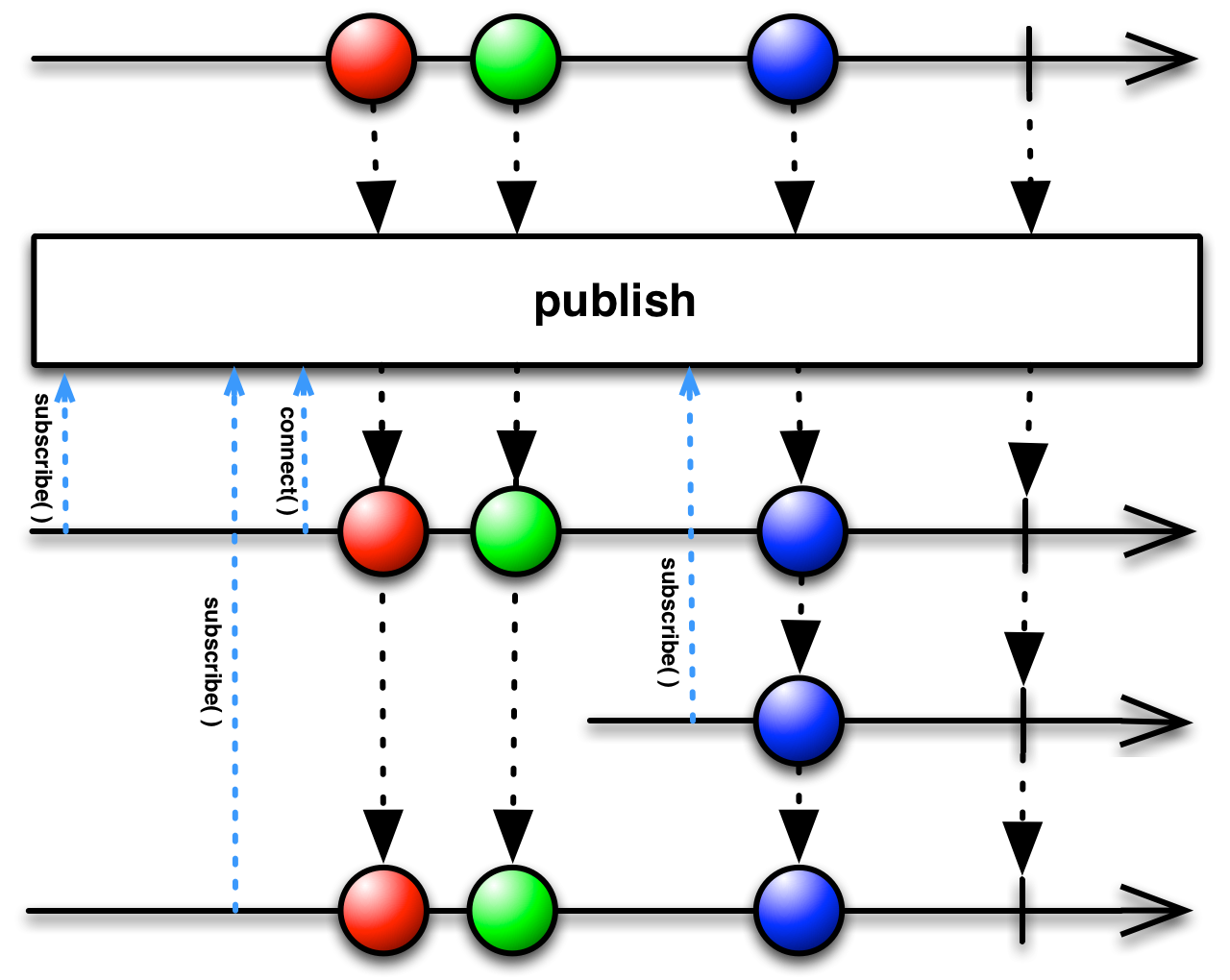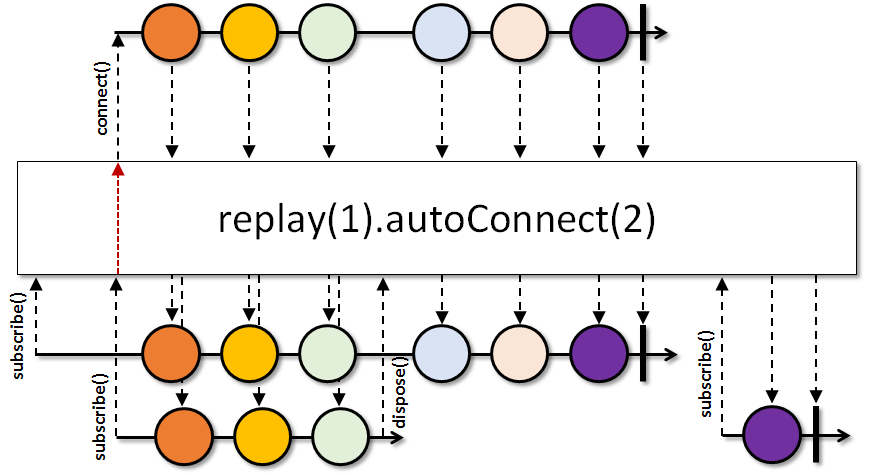
io.reactivex.observables.ConnectableObservable Maven / Gradle / Ivy
/**
* Copyright (c) 2016-present, RxJava Contributors.
*
* Licensed under the Apache License, Version 2.0 (the "License"); you may not use this file except in
* compliance with the License. You may obtain a copy of the License at
*
* http://www.apache.org/licenses/LICENSE-2.0
*
* Unless required by applicable law or agreed to in writing, software distributed under the License is
* distributed on an "AS IS" BASIS, WITHOUT WARRANTIES OR CONDITIONS OF ANY KIND, either express or implied. See
* the License for the specific language governing permissions and limitations under the License.
*/
package io.reactivex.observables;
import java.util.concurrent.TimeUnit;
import io.reactivex.*;
import io.reactivex.annotations.*;
import io.reactivex.disposables.Disposable;
import io.reactivex.functions.Consumer;
import io.reactivex.internal.functions.*;
import io.reactivex.internal.operators.observable.*;
import io.reactivex.internal.util.ConnectConsumer;
import io.reactivex.plugins.RxJavaPlugins;
import io.reactivex.schedulers.Schedulers;
/**
* A {@code ConnectableObservable} resembles an ordinary {@link Observable}, except that it does not begin
* emitting items when it is subscribed to, but only when its {@link #connect} method is called. In this way you
* can wait for all intended {@link Observer}s to {@link Observable#subscribe} to the {@code Observable}
* before the {@code Observable} begins emitting items.
*
*  *
* @see RxJava Wiki:
* Connectable Observable Operators
* @param
*
* @see RxJava Wiki:
* Connectable Observable Operators
* @param
* the type of items emitted by the {@code ConnectableObservable}
*/
public abstract class ConnectableObservable extends Observable {
/**
* Instructs the {@code ConnectableObservable} to begin emitting the items from its underlying
* {@link Observable} to its {@link Observer}s.
*
* @param connection
* the action that receives the connection subscription before the subscription to source happens
* allowing the caller to synchronously disconnect a synchronous source
* @see ReactiveX documentation: Connect
*/
public abstract void connect(@NonNull Consumer connection);
/**
* Instructs the {@code ConnectableObservable} to begin emitting the items from its underlying
* {@link Observable} to its {@link Observer}s.
*
* To disconnect from a synchronous source, use the {@link #connect(Consumer)} method.
*
* @return the subscription representing the connection
* @see ReactiveX documentation: Connect
*/
public final Disposable connect() {
ConnectConsumer cc = new ConnectConsumer();
connect(cc);
return cc.disposable;
}
/**
* Returns an {@code Observable} that stays connected to this {@code ConnectableObservable} as long as there
* is at least one subscription to this {@code ConnectableObservable}.
*
* - Scheduler:
* - This {@code refCount} overload does not operate on any particular {@link Scheduler}.
*
* @return an {@link Observable}
* @see ReactiveX documentation: RefCount
* @see #refCount(int)
* @see #refCount(long, TimeUnit)
* @see #refCount(int, long, TimeUnit)
*/
@NonNull
@CheckReturnValue
@SchedulerSupport(SchedulerSupport.NONE)
public Observable refCount() {
return RxJavaPlugins.onAssembly(new ObservableRefCount(this));
}
/**
* Connects to the upstream {@code ConnectableObservable} if the number of subscribed
* subscriber reaches the specified count and disconnect if all subscribers have unsubscribed.
*
* - Scheduler:
* - This {@code refCount} overload does not operate on any particular {@link Scheduler}.
*
* @param subscriberCount the number of subscribers required to connect to the upstream
* @return the new Observable instance
* @since 2.1.14 - experimental
*/
@CheckReturnValue
@Experimental
@SchedulerSupport(SchedulerSupport.NONE)
public final Observable refCount(int subscriberCount) {
return refCount(subscriberCount, 0, TimeUnit.NANOSECONDS, Schedulers.trampoline());
}
/**
* Connects to the upstream {@code ConnectableObservable} if the number of subscribed
* subscriber reaches 1 and disconnect after the specified
* timeout if all subscribers have unsubscribed.
*
* - Scheduler:
* - This {@code refCount} overload operates on the {@code computation} {@link Scheduler}.
*
* @param timeout the time to wait before disconnecting after all subscribers unsubscribed
* @param unit the time unit of the timeout
* @return the new Observable instance
* @since 2.1.14 - experimental
* @see #refCount(long, TimeUnit, Scheduler)
*/
@CheckReturnValue
@Experimental
@SchedulerSupport(SchedulerSupport.COMPUTATION)
public final Observable refCount(long timeout, TimeUnit unit) {
return refCount(1, timeout, unit, Schedulers.computation());
}
/**
* Connects to the upstream {@code ConnectableObservable} if the number of subscribed
* subscriber reaches 1 and disconnect after the specified
* timeout if all subscribers have unsubscribed.
*
* - Scheduler:
* - This {@code refCount} overload operates on the specified {@link Scheduler}.
*
* @param timeout the time to wait before disconnecting after all subscribers unsubscribed
* @param unit the time unit of the timeout
* @param scheduler the target scheduler to wait on before disconnecting
* @return the new Observable instance
* @since 2.1.14 - experimental
*/
@CheckReturnValue
@Experimental
@SchedulerSupport(SchedulerSupport.CUSTOM)
public final Observable refCount(long timeout, TimeUnit unit, Scheduler scheduler) {
return refCount(1, timeout, unit, scheduler);
}
/**
* Connects to the upstream {@code ConnectableObservable} if the number of subscribed
* subscriber reaches the specified count and disconnect after the specified
* timeout if all subscribers have unsubscribed.
*
* - Scheduler:
* - This {@code refCount} overload operates on the {@code computation} {@link Scheduler}.
*
* @param subscriberCount the number of subscribers required to connect to the upstream
* @param timeout the time to wait before disconnecting after all subscribers unsubscribed
* @param unit the time unit of the timeout
* @return the new Observable instance
* @since 2.1.14 - experimental
* @see #refCount(int, long, TimeUnit, Scheduler)
*/
@CheckReturnValue
@Experimental
@SchedulerSupport(SchedulerSupport.COMPUTATION)
public final Observable refCount(int subscriberCount, long timeout, TimeUnit unit) {
return refCount(subscriberCount, timeout, unit, Schedulers.computation());
}
/**
* Connects to the upstream {@code ConnectableObservable} if the number of subscribed
* subscriber reaches the specified count and disconnect after the specified
* timeout if all subscribers have unsubscribed.
*
* - Scheduler:
* - This {@code refCount} overload operates on the specified {@link Scheduler}.
*
* @param subscriberCount the number of subscribers required to connect to the upstream
* @param timeout the time to wait before disconnecting after all subscribers unsubscribed
* @param unit the time unit of the timeout
* @param scheduler the target scheduler to wait on before disconnecting
* @return the new Observable instance
* @since 2.1.14 - experimental
*/
@CheckReturnValue
@Experimental
@SchedulerSupport(SchedulerSupport.CUSTOM)
public final Observable refCount(int subscriberCount, long timeout, TimeUnit unit, Scheduler scheduler) {
ObjectHelper.verifyPositive(subscriberCount, "subscriberCount");
ObjectHelper.requireNonNull(unit, "unit is null");
ObjectHelper.requireNonNull(scheduler, "scheduler is null");
return RxJavaPlugins.onAssembly(new ObservableRefCount(this, subscriberCount, timeout, unit, scheduler));
}
/**
* Returns an Observable that automatically connects (at most once) to this ConnectableObservable
* when the first Observer subscribes.
*
*  *
*
* The connection happens after the first subscription and happens at most once
* during the lifetime of the returned Observable. If this ConnectableObservable
* terminates, the connection is never renewed, no matter how Observers come
* and go. Use {@link #refCount()} to renew a connection or dispose an active
* connection when all {@code Observers}s have disposed their {@code Disposable}s.
*
* This overload does not allow disconnecting the connection established via
* {@link #connect(Consumer)}. Use the {@link #autoConnect(int, Consumer)} overload
* to gain access to the {@code Disposable} representing the only connection.
*
* @return an Observable that automatically connects to this ConnectableObservable
* when the first Observer subscribes
*/
@NonNull
public Observable autoConnect() {
return autoConnect(1);
}
/**
* Returns an Observable that automatically connects (at most once) to this ConnectableObservable
* when the specified number of Observers subscribe to it.
*
*  *
*
* The connection happens after the given number of subscriptions and happens at most once
* during the lifetime of the returned Observable. If this ConnectableObservable
* terminates, the connection is never renewed, no matter how Observers come
* and go. Use {@link #refCount()} to renew a connection or dispose an active
* connection when all {@code Observers}s have disposed their {@code Disposable}s.
*
* This overload does not allow disconnecting the connection established via
* {@link #connect(Consumer)}. Use the {@link #autoConnect(int, Consumer)} overload
* to gain access to the {@code Disposable} representing the only connection.
*
* @param numberOfSubscribers the number of subscribers to await before calling connect
* on the ConnectableObservable. A non-positive value indicates
* an immediate connection.
* @return an Observable that automatically connects to this ConnectableObservable
* when the specified number of Subscribers subscribe to it
*/
@NonNull
public Observable autoConnect(int numberOfSubscribers) {
return autoConnect(numberOfSubscribers, Functions.emptyConsumer());
}
/**
* Returns an Observable that automatically connects (at most once) to this ConnectableObservable
* when the specified number of Subscribers subscribe to it and calls the
* specified callback with the Subscription associated with the established connection.
*
*  *
*
* The connection happens after the given number of subscriptions and happens at most once
* during the lifetime of the returned Observable. If this ConnectableObservable
* terminates, the connection is never renewed, no matter how Observers come
* and go. Use {@link #refCount()} to renew a connection or dispose an active
* connection when all {@code Observers}s have disposed their {@code Disposable}s.
*
* @param numberOfSubscribers the number of subscribers to await before calling connect
* on the ConnectableObservable. A non-positive value indicates
* an immediate connection.
* @param connection the callback Consumer that will receive the Subscription representing the
* established connection
* @return an Observable that automatically connects to this ConnectableObservable
* when the specified number of Subscribers subscribe to it and calls the
* specified callback with the Subscription associated with the established connection
*/
@NonNull
public Observable autoConnect(int numberOfSubscribers, @NonNull Consumer connection) {
if (numberOfSubscribers <= 0) {
this.connect(connection);
return RxJavaPlugins.onAssembly(this);
}
return RxJavaPlugins.onAssembly(new ObservableAutoConnect(this, numberOfSubscribers, connection));
}
}